You are using an out of date browser. It may not display this or other websites correctly.
You should upgrade or use an alternative browser.
You should upgrade or use an alternative browser.
[RFC-DoC] Vive la France
- Thread starter Lone Wolf
- Start date
Alexius08
Emperor
- Joined
- May 28, 2010
- Messages
- 1,200
How exactly was Huyana Capac pleased with you while you were at war with him?
When you meet a new world civ as an old world civ, you'd go to war at them whether you like it or not. That probably explains the lack of "You declared war on us!"
Lord_Herobrine
Back in the Saddle
The feast to the east sounds very tasty.. 
You can have some Turkey and a Belgian Waffle, then finish it off with some spiced wine imported from Spain. If that doesn't sate your hunger, there is also some English Muffins around.

You can have some Turkey and a Belgian Waffle, then finish it off with some spiced wine imported from Spain. If that doesn't sate your hunger, there is also some English Muffins around.
Lone Wolf
Deity
- Joined
- Dec 4, 2006
- Messages
- 9,908
French UP, probably.How exactly was Huyana Capac pleased with you while you were at war with him?
Next round involves no new conquests, just consolidation.
--------------------
Ex oriente lux - the Eastern knowledge was beneficial to the French, even though the Chinese were not very happy exchanging knowledge with "Western barbarians".

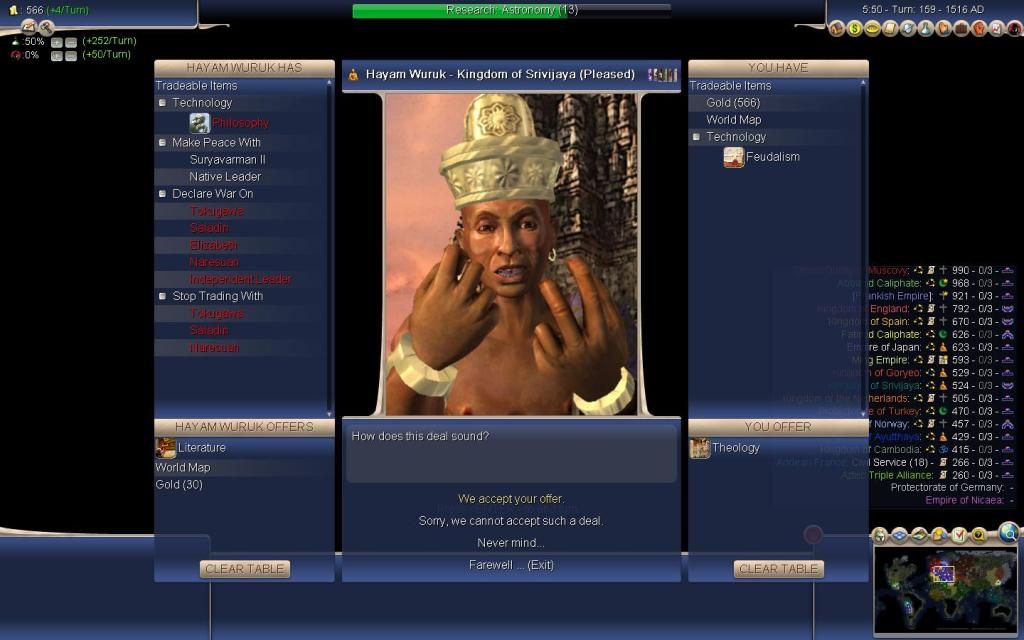
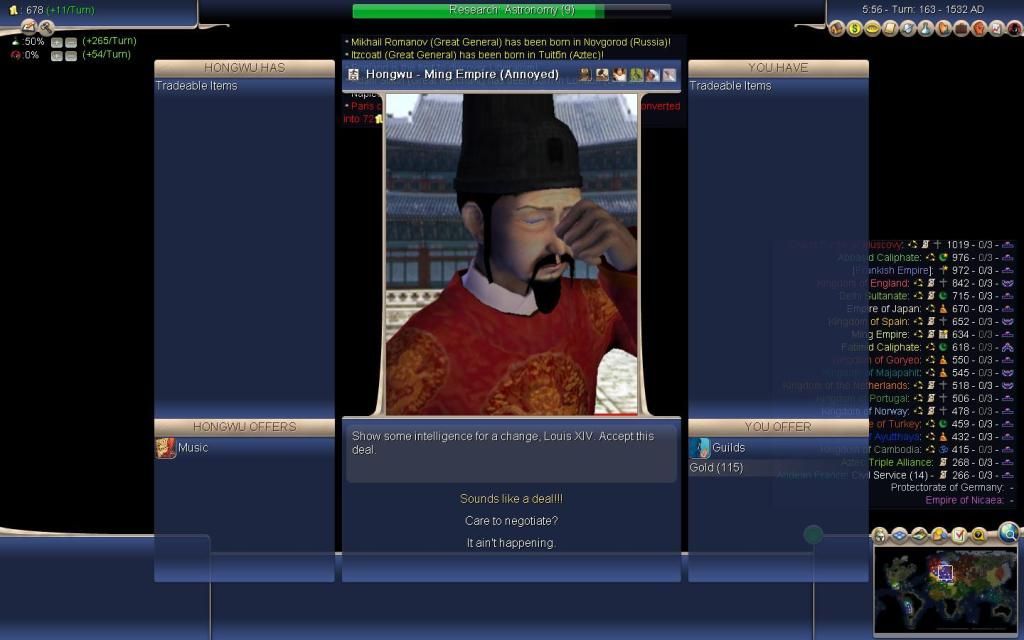
The Aztec remnant declaring war, however, was not beneficial at all.
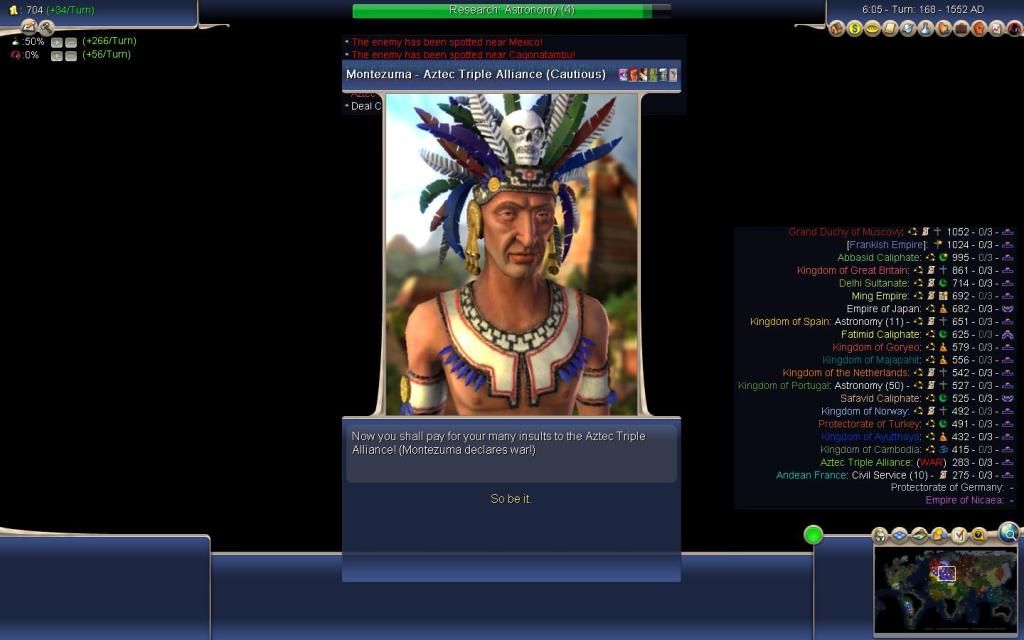
While the English are engaging in a conflict versus the Delhi Sultanate of India.
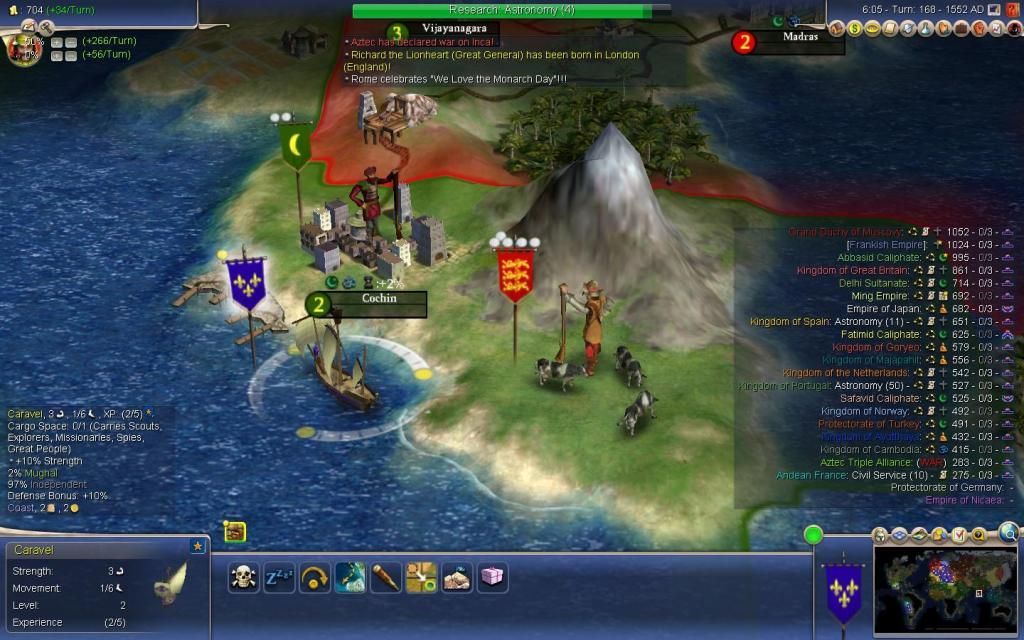
Jacques was not at all happy.
He enlisted as a soldier in the French Army, thinking that he'd be stationed for garrison duty in his native Occitania. But he was told that the Mexican garrison was getting a bit thin and sent accross the sea to this Godforsaken place.
The trip was awful. Jacques always disliked sea, since he was a boy. And Mexican climes often gave him headache.
And now, the savages from the north had decided to attack.
They were brutal. Jacques often heard horrible stories about the chief, who, it was said, wears the skulls of those slain by him in his headdress. The thought of one of these skulls being his own was, shall we say, unpleasant to Jacques.
And the thought of being sacrificed on their savage altars - apparently, you were still conscious when they ripped your heart from you - was even more unpleasant.
Jacques needn't have worried. He was killed by a bolt thrown by one of Aztec Crossbowmen. Many others from his regiment were less lucky.
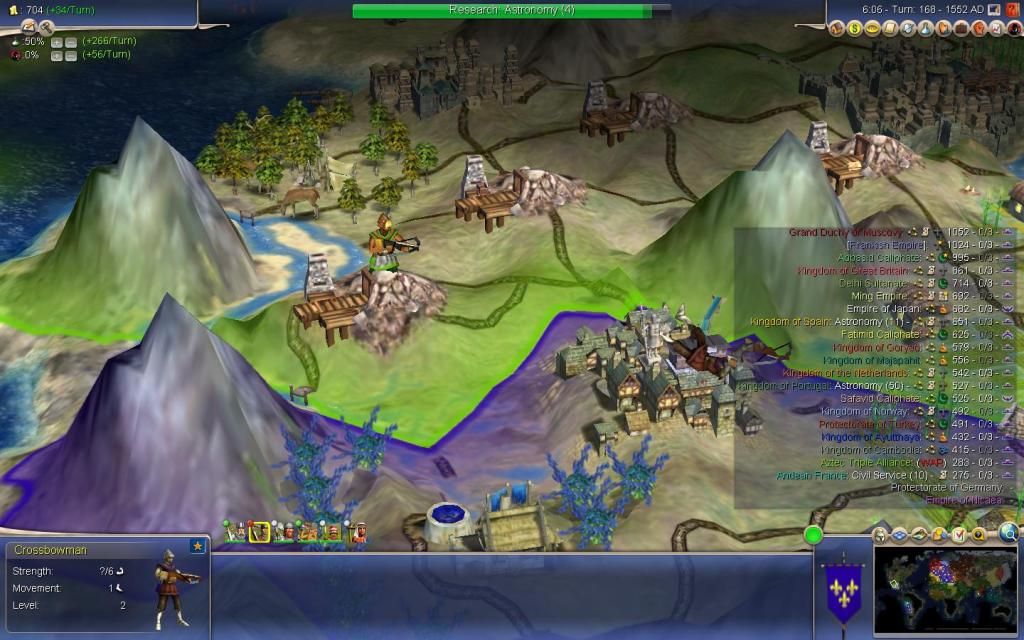
The English experienced something similar in India, as Siege Elephants rained death on troops defending English outposts.
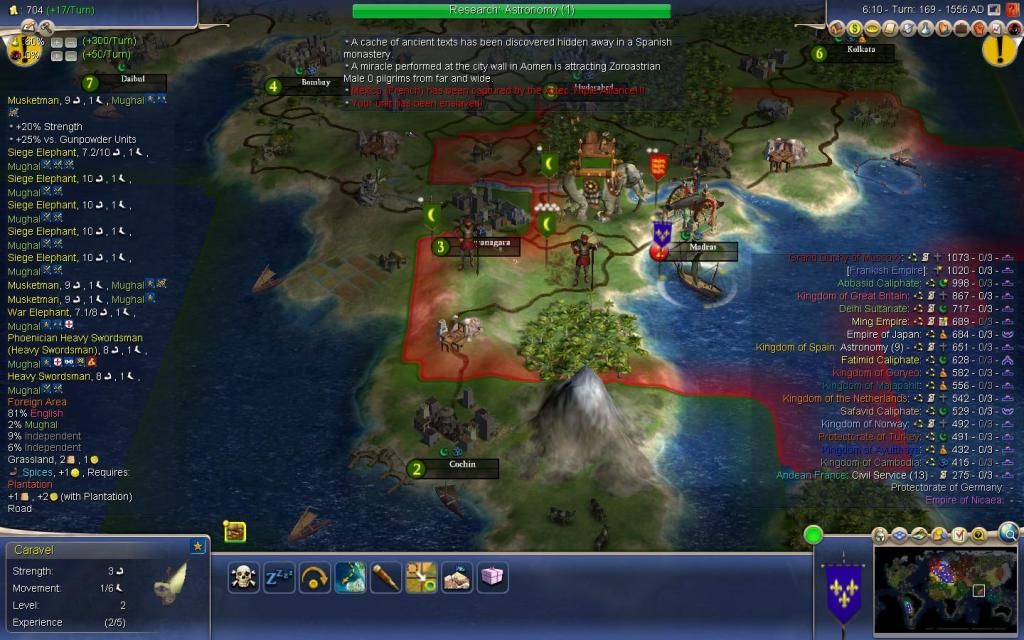
The Aztecs had pushed the French out of Mexico. For now.
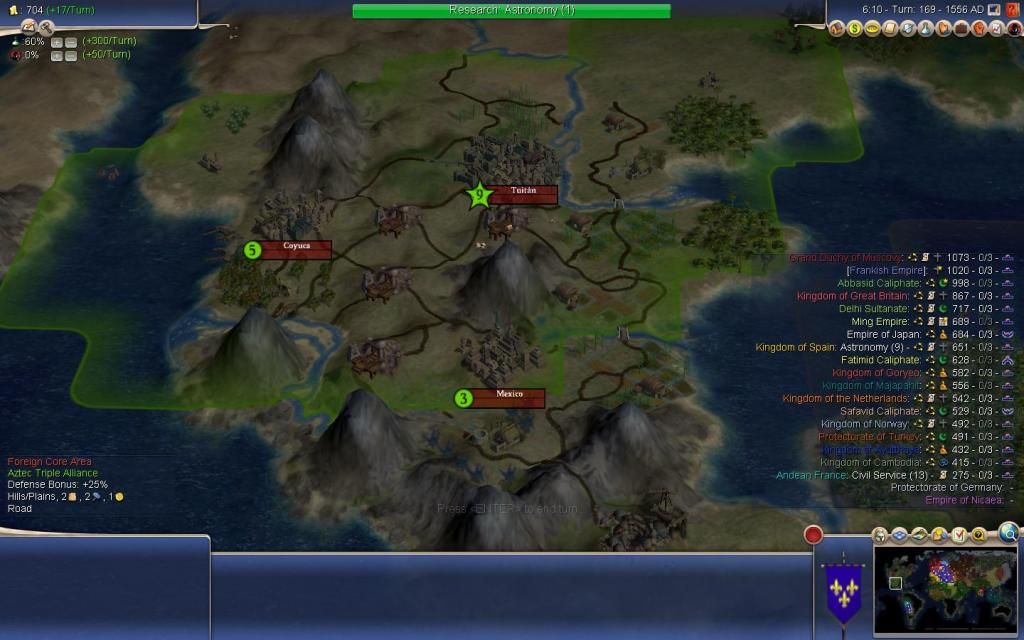
Two strongest nations on the planet, Russia and France, developed trading links between them.

English colonial attempts in India were decisively repulsed in 1560.

That what internal structure of the French Empire looked like.

French companies continued to gain profits from trade with the East.
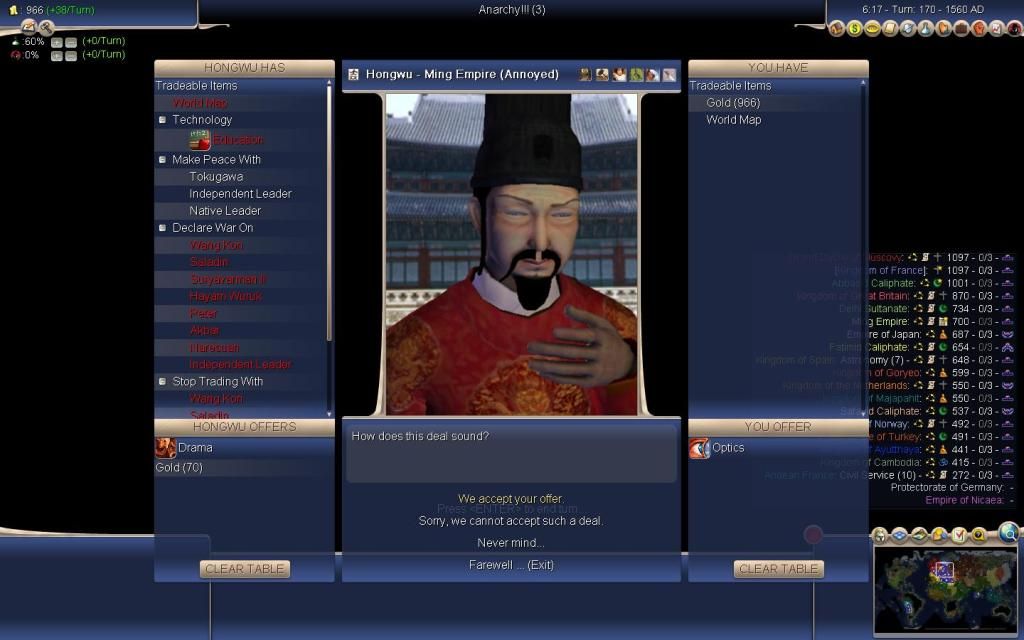
The foggy, rainy island accross La Manche was still the most advanced.
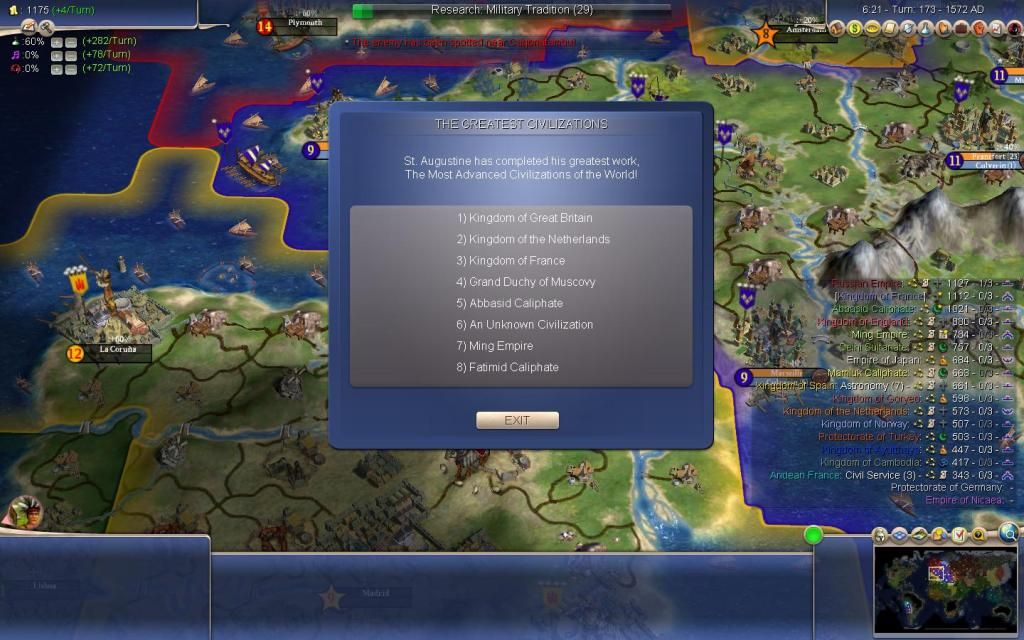
In the second half of 16th century, the courtly salon culture was flourishing in France.

And science was prospering, too. Yet nobody was able to prove the theorem of Fermat.

Architecture also underwent a considerable revival.
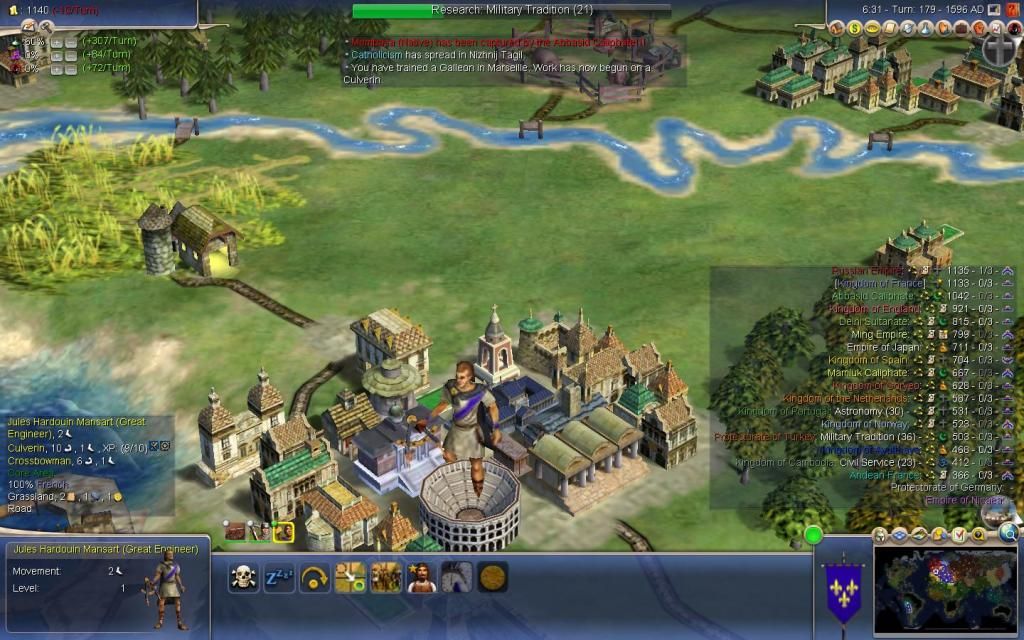
The Russian Tsar had claimed the throne of Spain. French people could only watch as large Russian armies move accross their land, usually to their deaths.
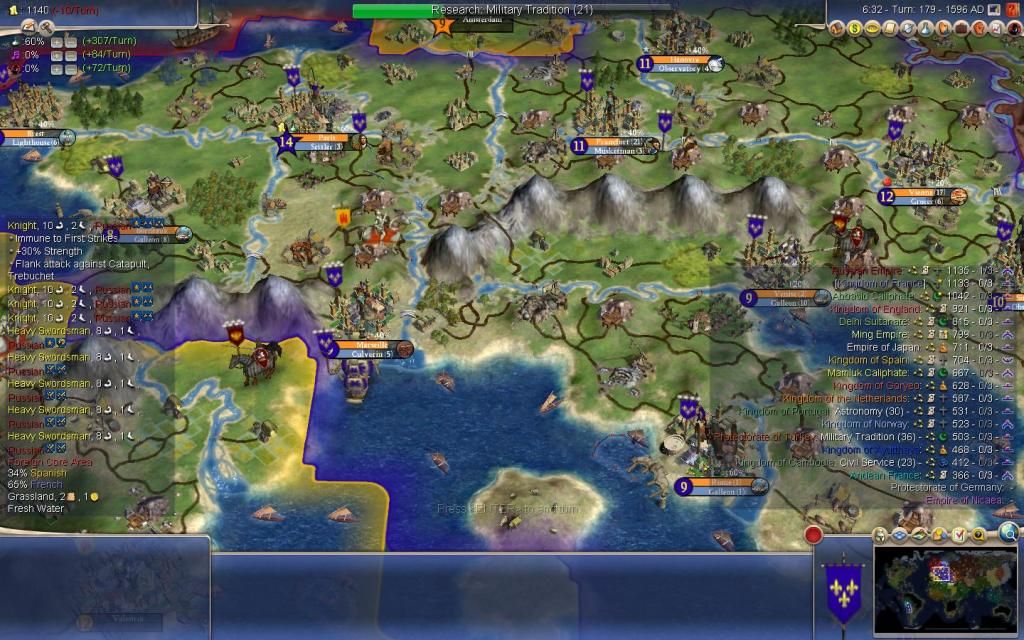
Despite the increasing sophistication of French culture, political unstability was troubling the realm. Regional separatists agitated for independence.
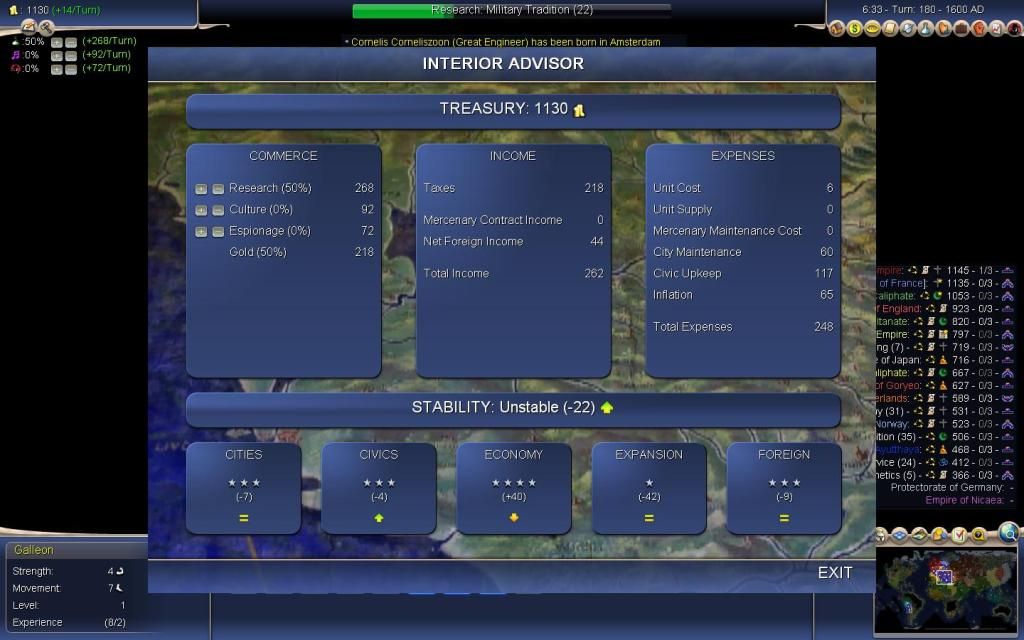
To counteract the political turmoil, the government placed emphasis on developing the economy of backwards areas.
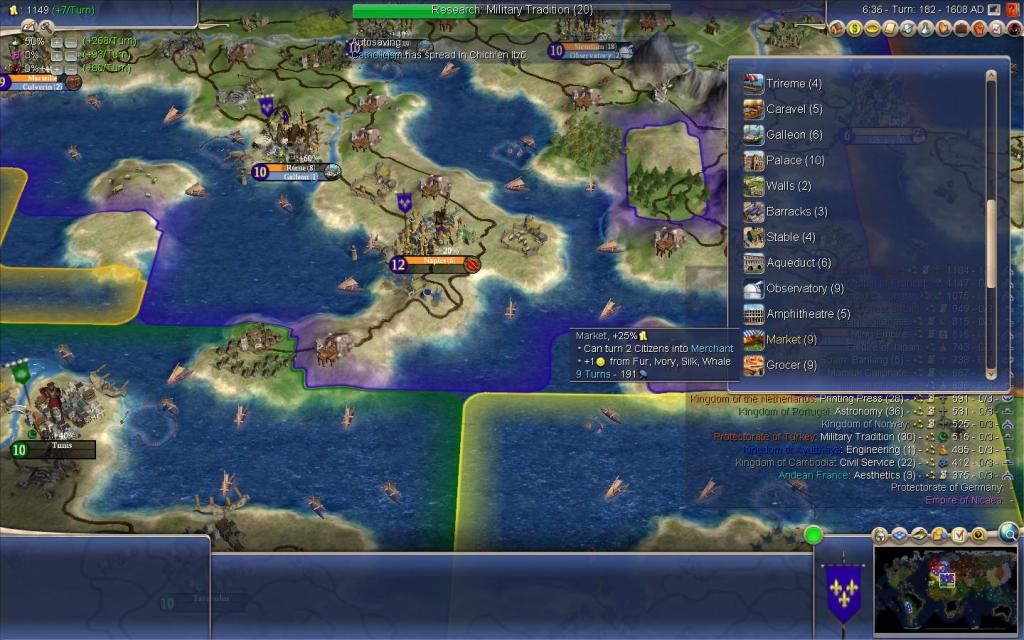
Last edited:
CivDad
King of Garama
Wonderful Story.
GHalfrunt
Just zis guy, you know?
Subbed.
Lone Wolf
Deity
- Joined
- Dec 4, 2006
- Messages
- 9,908
The realm decides to concentrate on defence.

Other European powers now have their own colonies in the New World.

A new expedition is sent to Mexico.
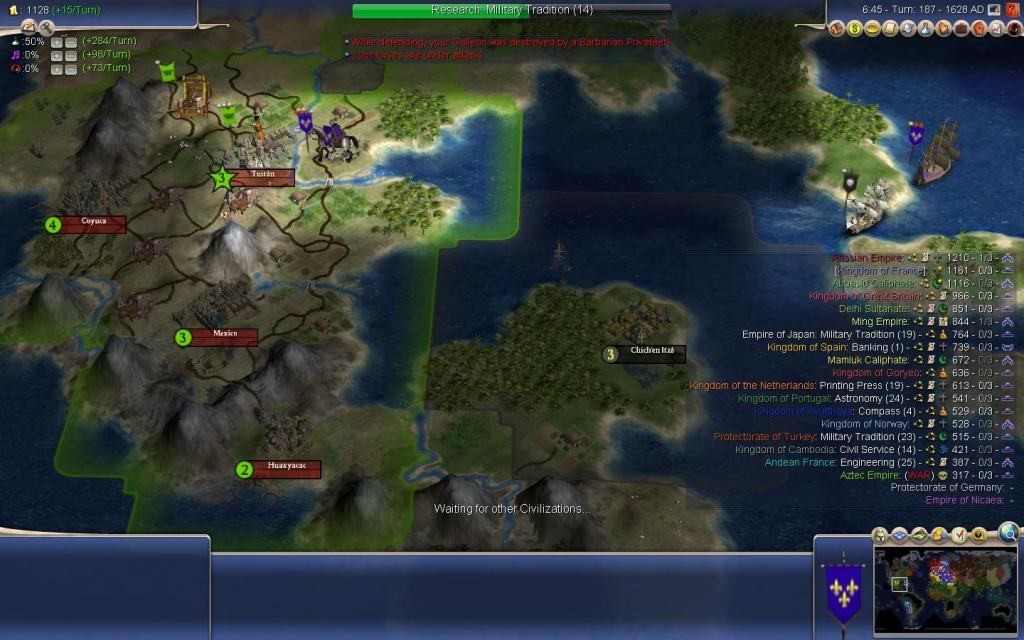
Charlres Le Brun pens an epic poem about Rome's prosperity in the French Empire.

First French settler enterprise is founded. The island of Cuba is rich in spices of various kinds. For both local and African slaves, however, these riches bring nothing but back-breaking labour and tears.

The assault of Tuitan begins.

New French fortifications increase the international reputation of France even more.
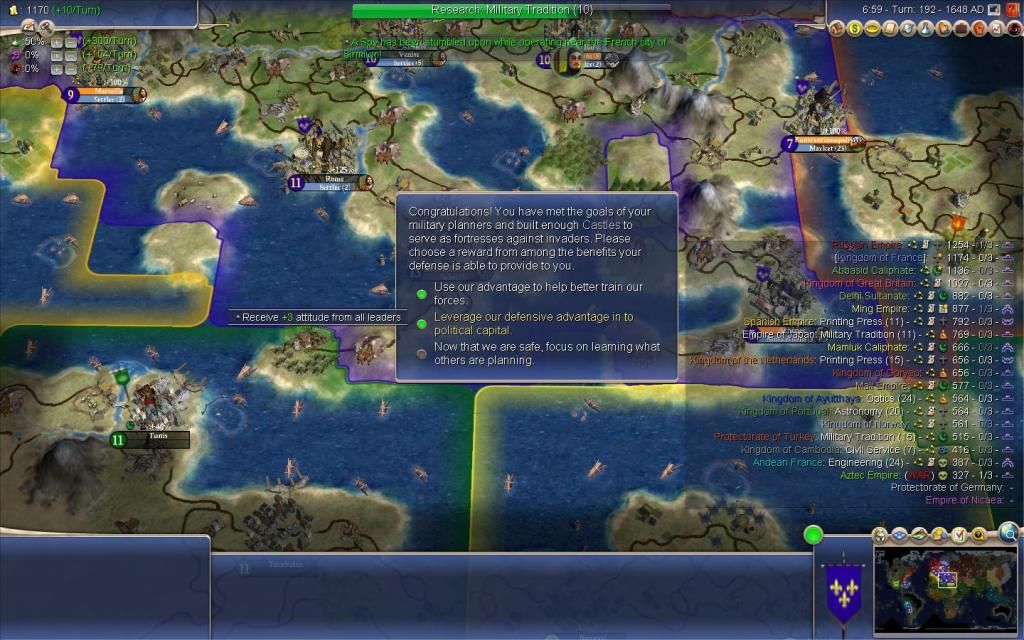
The people of the Orient still have some knowledge to offer the French.
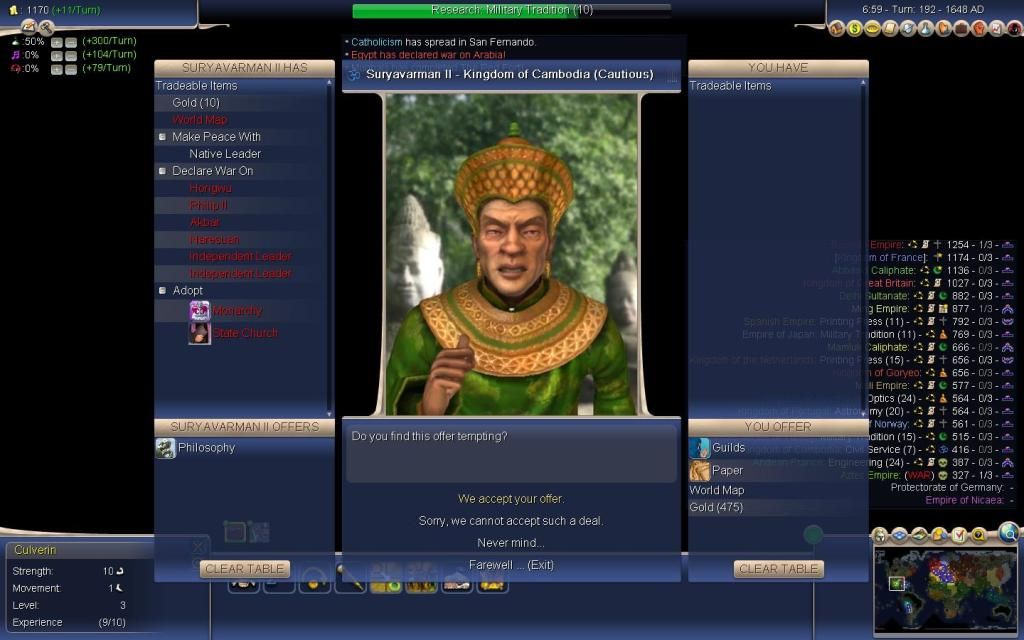
Finally, Tuitan is captured and the horrible Aztec altars destroyed.

French armies assault Mexico.

Pascal gains prominence in Hanover.
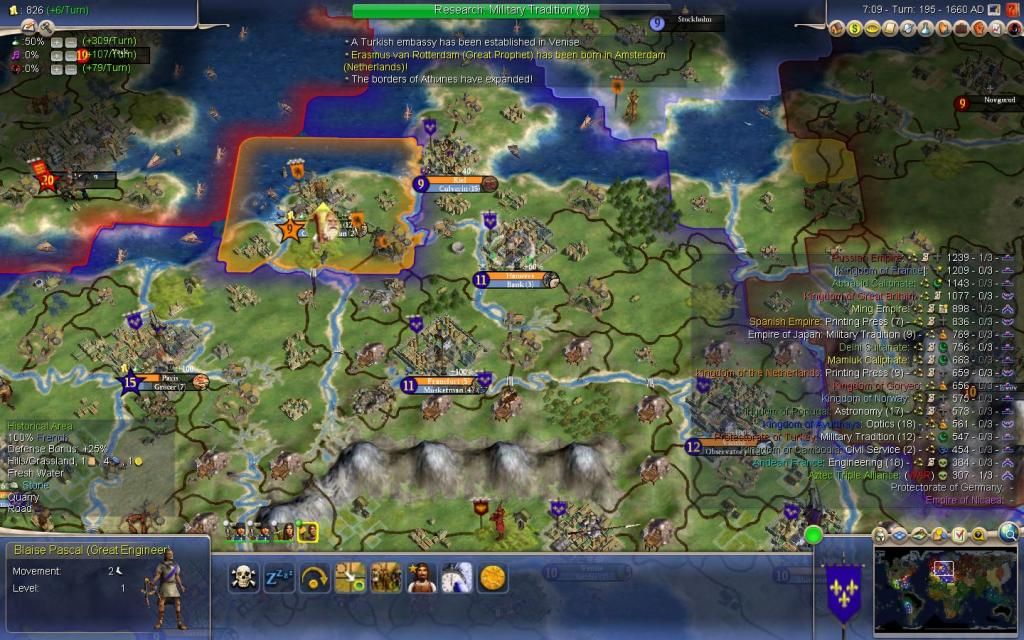
While de Montcalm trains our troops in Francfort.

The streets of Mexico witness the Second French Conquest.

In 1668, the Sultan of Egypt asked le Roi for protection. His wish was granted. This, however, requires us to declare war on the Arabian caliphate.
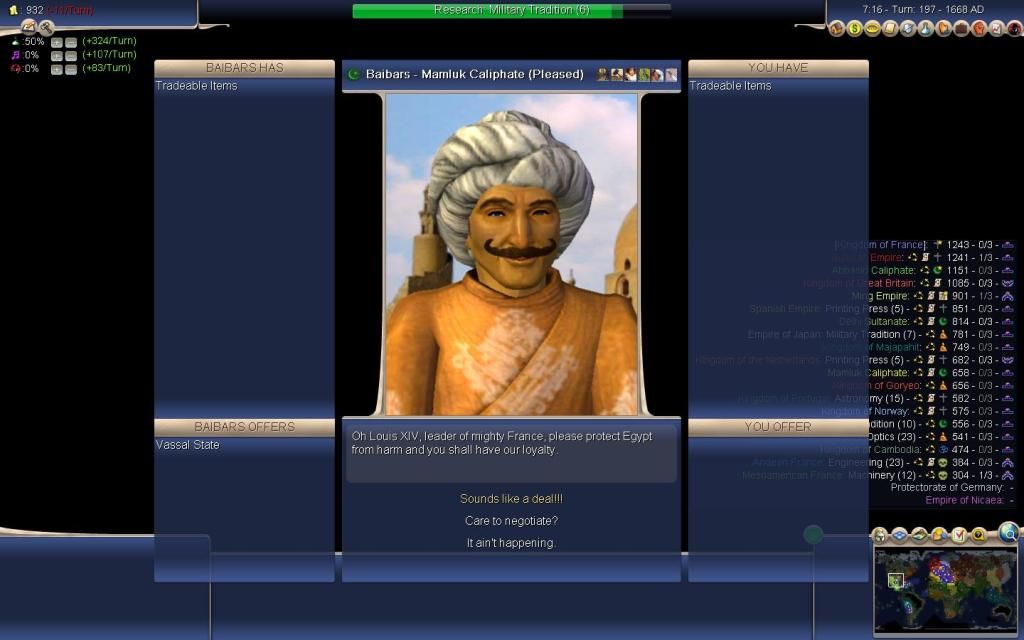
French scientists and ethnographers were sent to the new dependency, to categorize and describe the ancient monuments of Egypt.
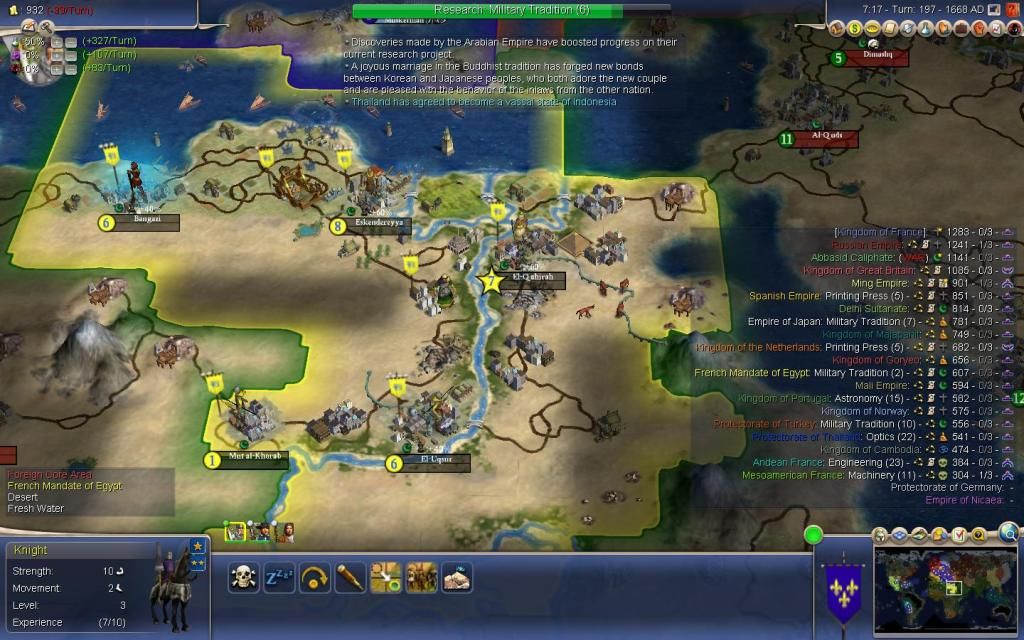
After the capture of Mexico, remaining Aztec chieftains agreed to submit to the Empire. This allowed the French to attack the natives of the North.

Supplying new good from America to Europe gives a considerable boost to French treasury.

It also gives a boost to the diet of Russian troops who still enter French territory in their desire to subdue Spain.
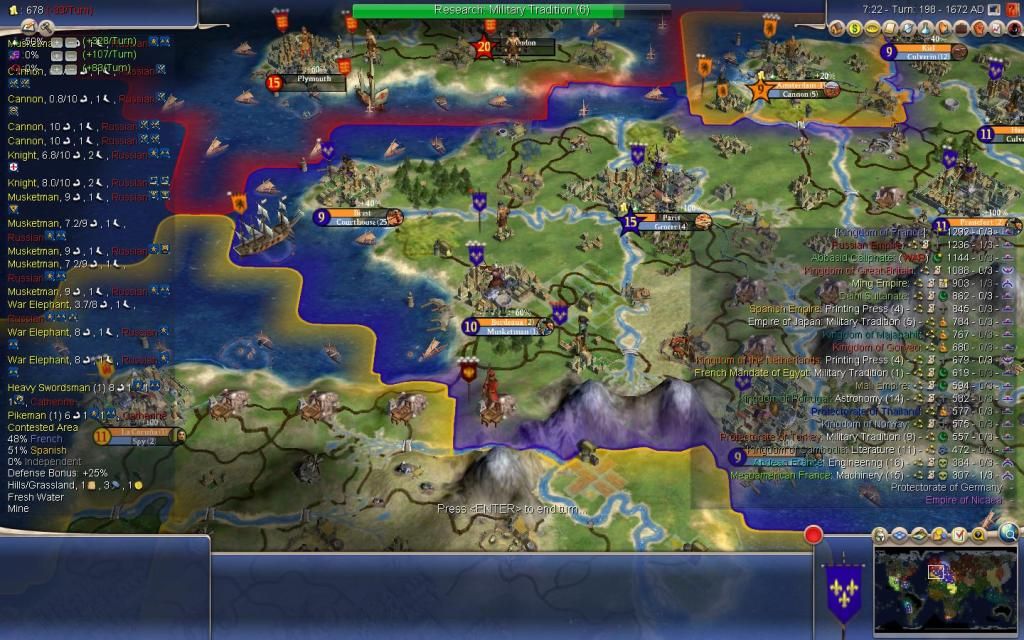

Other European powers now have their own colonies in the New World.

A new expedition is sent to Mexico.

Charlres Le Brun pens an epic poem about Rome's prosperity in the French Empire.

First French settler enterprise is founded. The island of Cuba is rich in spices of various kinds. For both local and African slaves, however, these riches bring nothing but back-breaking labour and tears.

The assault of Tuitan begins.

New French fortifications increase the international reputation of France even more.

The people of the Orient still have some knowledge to offer the French.

Finally, Tuitan is captured and the horrible Aztec altars destroyed.

French armies assault Mexico.

Pascal gains prominence in Hanover.

While de Montcalm trains our troops in Francfort.

The streets of Mexico witness the Second French Conquest.

In 1668, the Sultan of Egypt asked le Roi for protection. His wish was granted. This, however, requires us to declare war on the Arabian caliphate.

French scientists and ethnographers were sent to the new dependency, to categorize and describe the ancient monuments of Egypt.

After the capture of Mexico, remaining Aztec chieftains agreed to submit to the Empire. This allowed the French to attack the natives of the North.

Supplying new good from America to Europe gives a considerable boost to French treasury.

It also gives a boost to the diet of Russian troops who still enter French territory in their desire to subdue Spain.

Last edited:
Lone Wolf
Deity
- Joined
- Dec 4, 2006
- Messages
- 9,908
France expanded her colonial empire, founding Fort Coligny in Brazil.
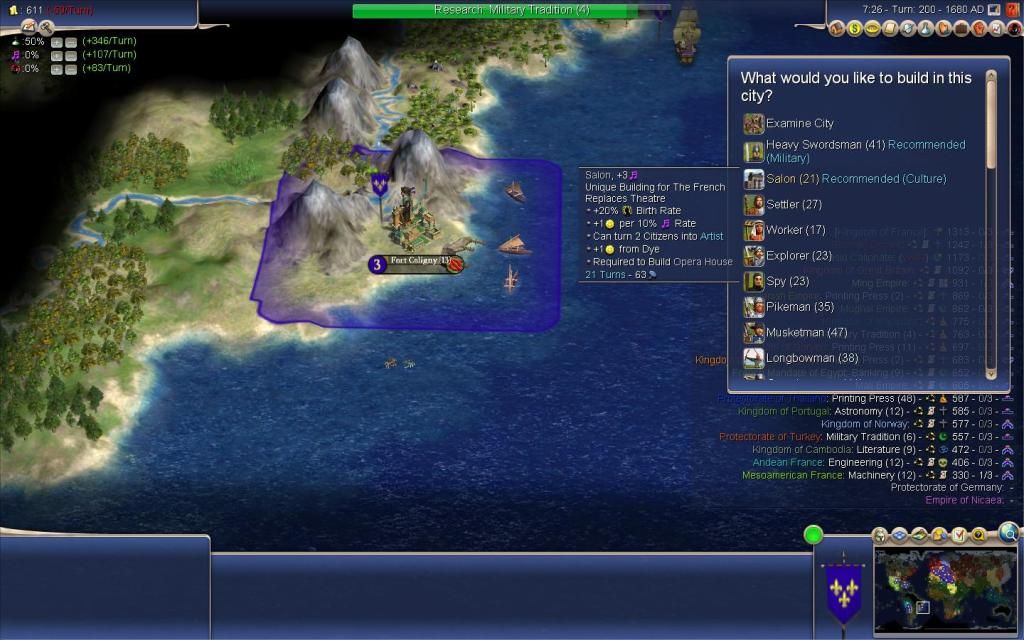
A warlord named Shivaji revolted against the Great Mughal. His revolt was soon crashed by the Mughal's hordes.
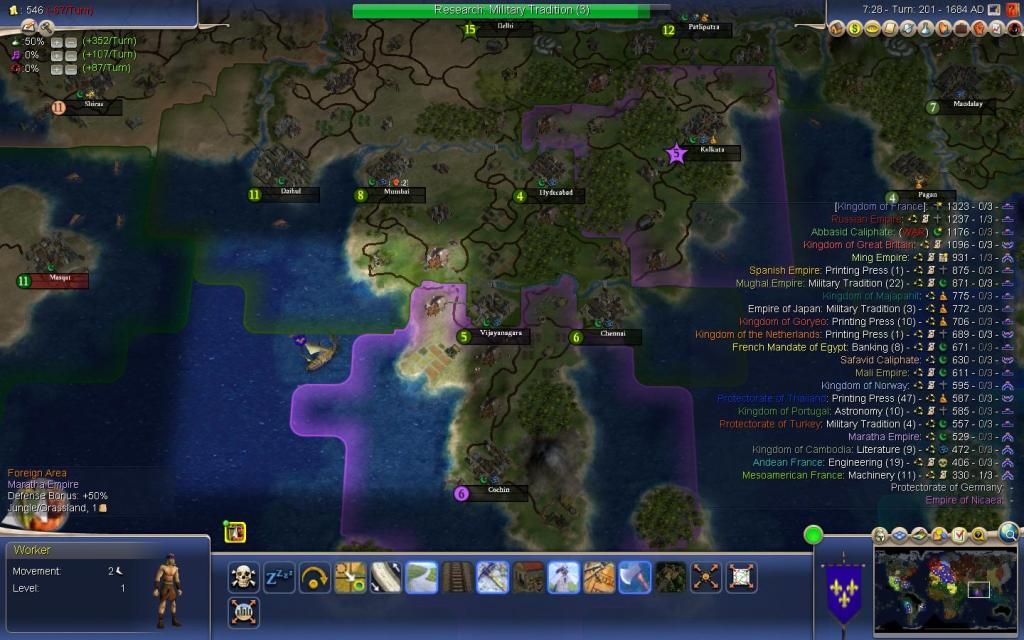
The governor of Louisiana seized a large amount of fertile land from the natives.

Meanwhile, French armies land in Tunis to stop the Barbary Pirates.

The Ming court introduced French ambassadors to the Chinese printing press.

After a heavy siege, Tunis was captured.
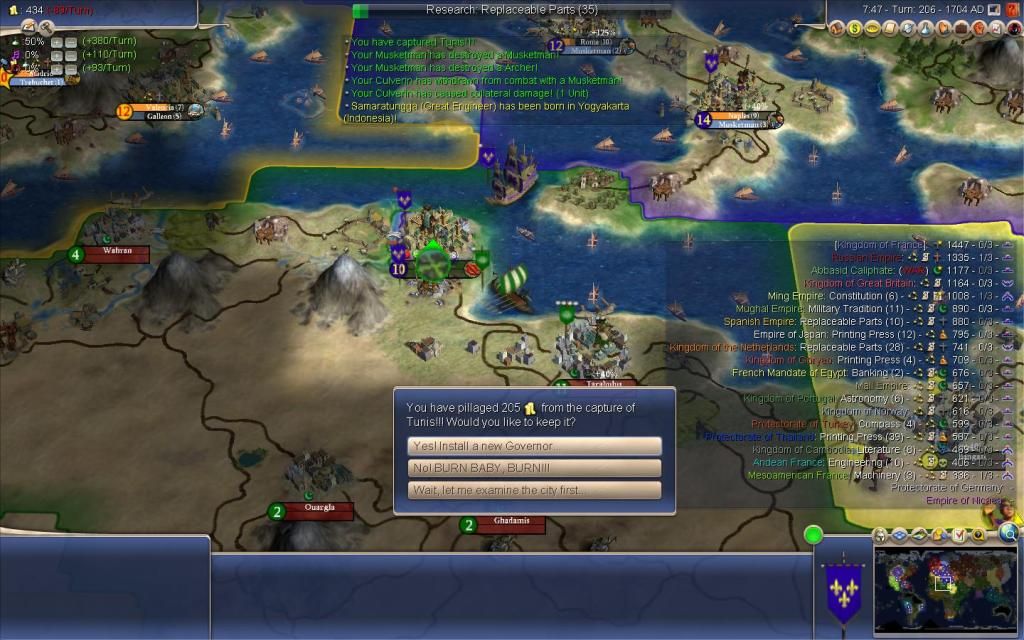
French diplomats attempted to get in good graces with the Japanese Shogun in order to open the lucrative Japanese market for French goods.
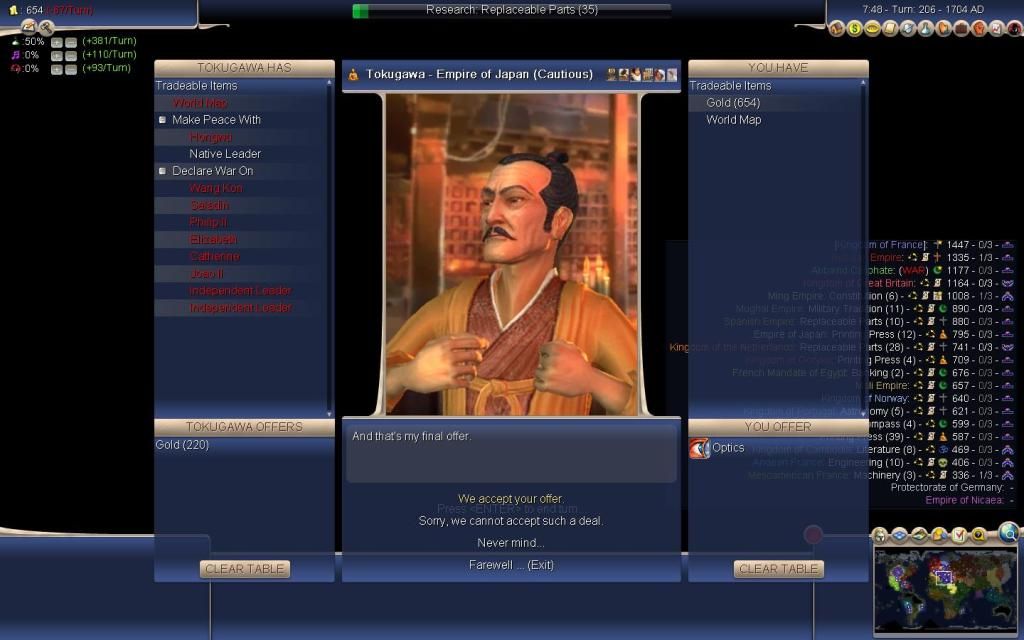
Pascal was famous for his research on Replaceable Parts.
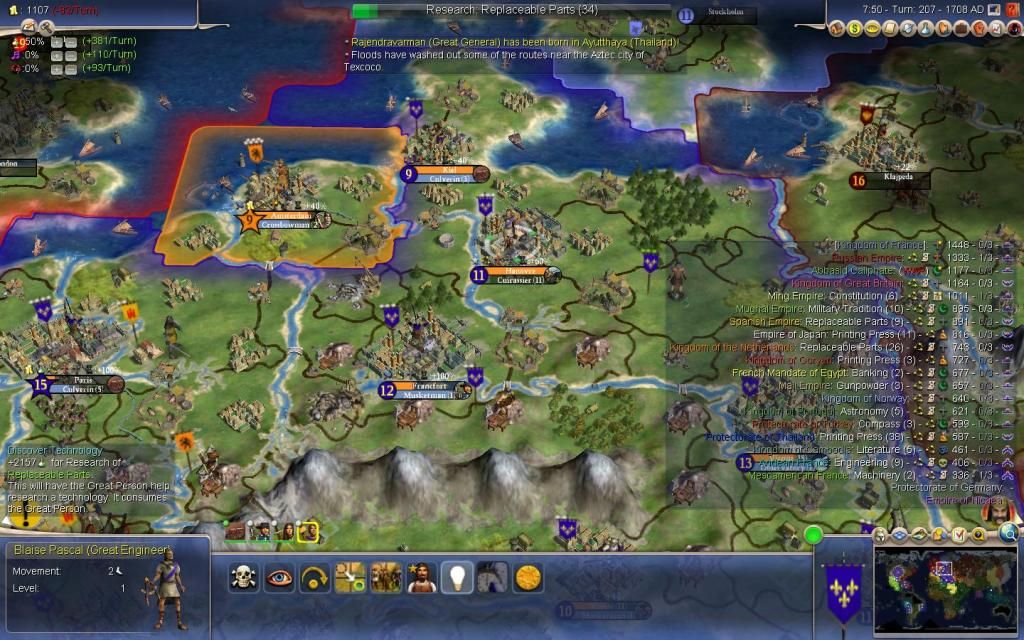
Madagascar was colonized in 1712.

In the same year, the pro-French Tlatoani of Mexico was killed by his brother, who was reported to be an enemy of France. However, he failed to secure his power, and his realm descended into anarchy, with various petty chiefs forming their own kingdoms.
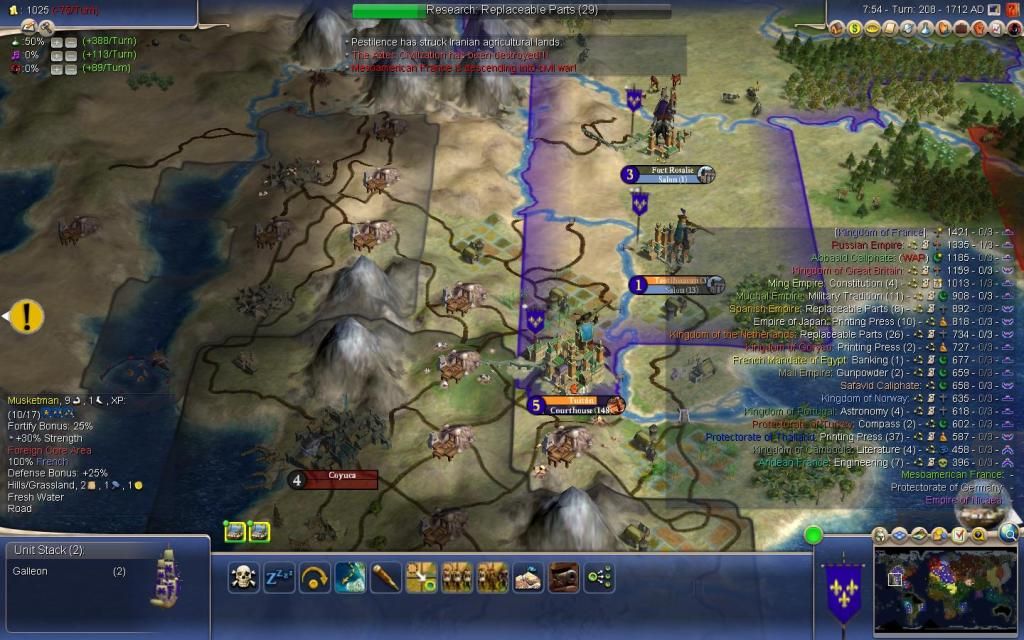
The beginning of 18th century was truly the age of Scientific Enlightenment.
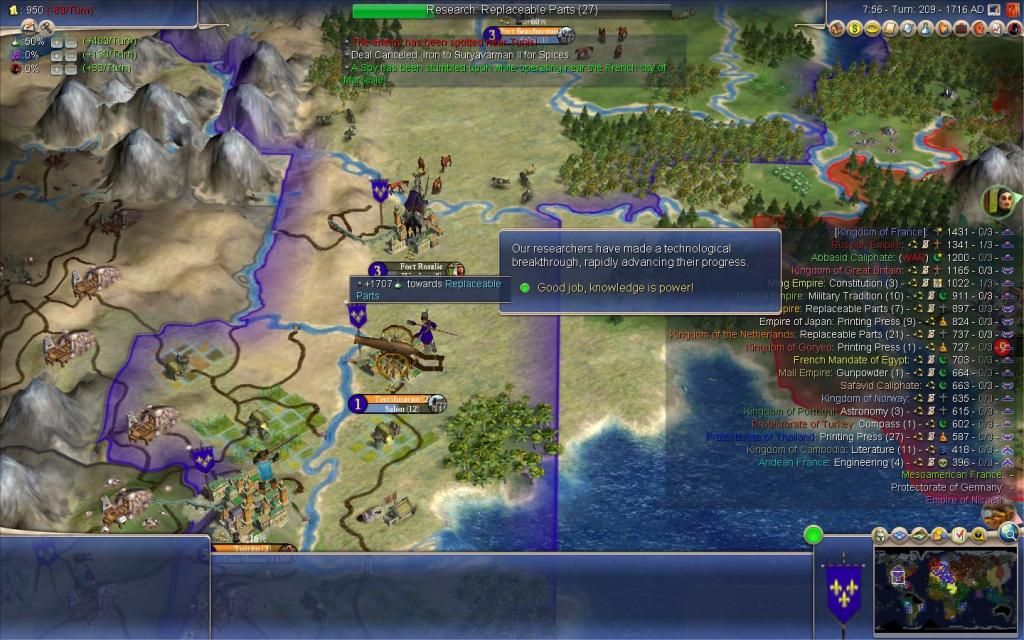
Jacques Cartier was a traveller merchant who visited Delhi in 1716. His descriptions of Indian exotics influenced French perceptions of India for years to come.
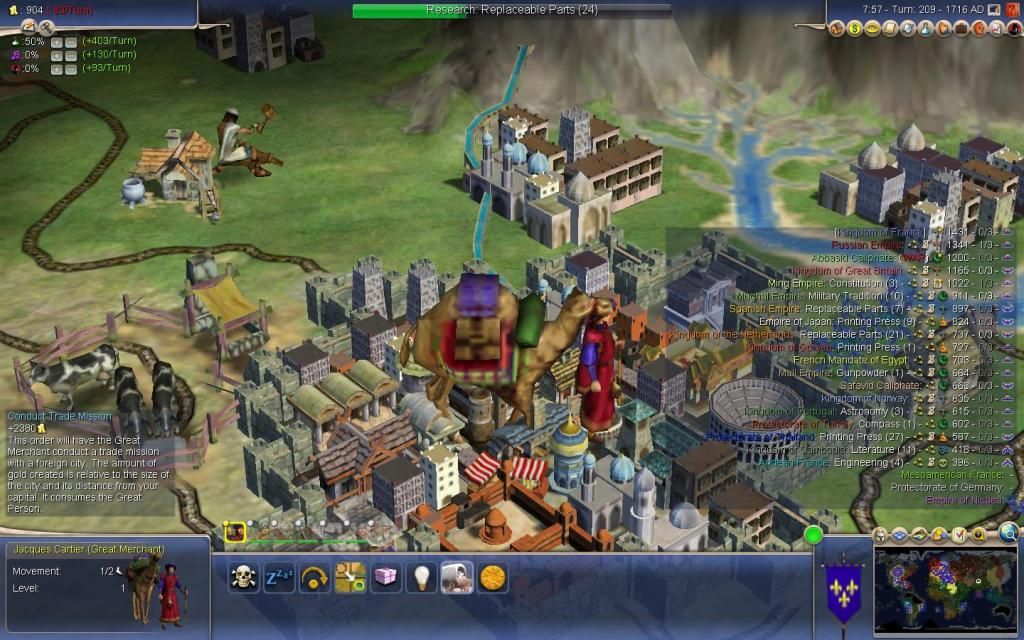
The Senate of Netherlands, seeing French superiority, agreed to accept the French king as the Stadtholder, in return for autonomy.
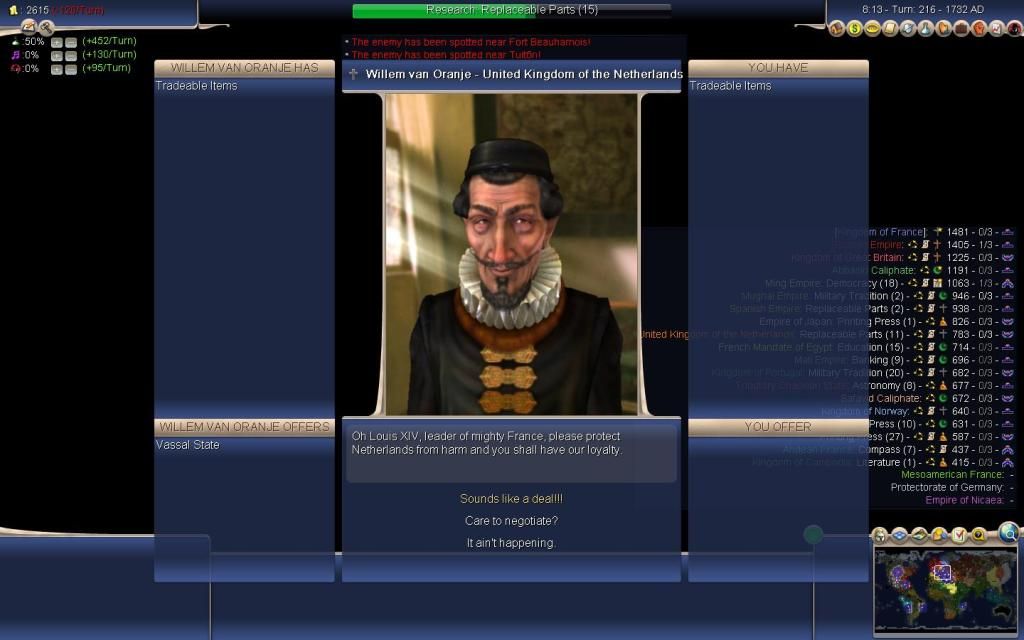
Japan was flooded by French goods. Local industry declined, and the whole land soon was economically dependent on France. With the installation of French adviser to the Shogun, this dependency became political as well. This was the turning point of French involvement in the Far East.

France declared her support for Spain in the Spanish-Russian conflict, but refused to intervene so far.

Despite French protests, the English started to conquer Mexican chiefdoms. Afraid of the whole Mexico falling to the British, the French governor sent troops to re-annex Tenochtitlan.

The "Japanese Strategy" was tried in regards to the Spice Islands, with same successful results.

The new expansionism was supported by Jean Calvin, a preacher who insisted that France, as the most Christian nation, has the right to conquer non-Christian peoples in order to bring the Gospel to them. He was overjoyed when France unloaded her troops in Siam.

The king of Siam was not prepared for the invasion.

With the conquest of Siam, France cemented her position as a Great Power in the Far East.
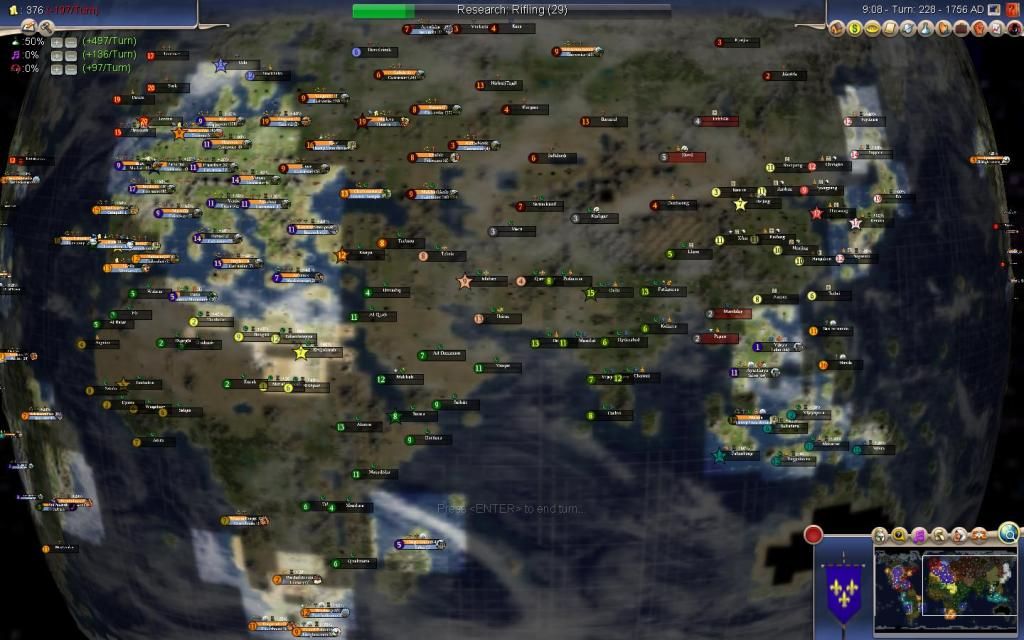
In 1778, the populace of Siam revolted against the French. French settlement in Ayutthaya was destroyed, and the rebels, under legitimist and religious slogans, restored the old monarchy.
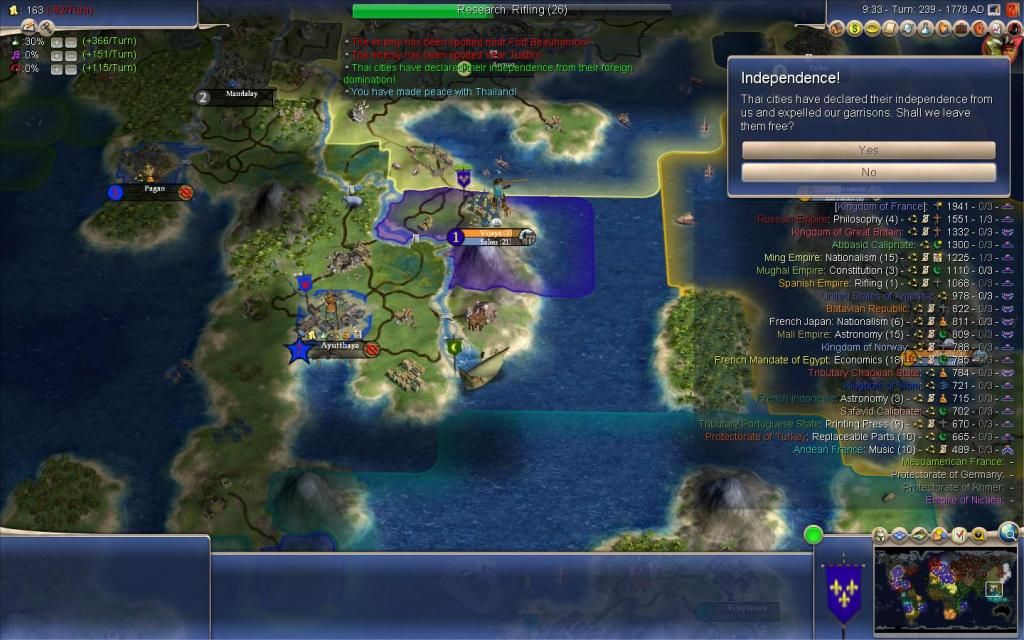
But the revolt was quickly subdued.

From 'La Gazette', on the Siamese revolt:
The road of enlightenment and virtue is not as easy as it seems. Though the Sun of France shines brightly over the whole world, illuminating it with its sophisticated knowledge, its steadfast Catholic faith and its military might, there are still some who are opposed to these lofty ideals - and it is the duty of every Frenchman to fight them. Let events of Siam be an example of the French bravery and steadfastness.
The rebels attempted to restore the tyranny of old kings and superstitions. Their hatred for France and her ideals was the most evident when they massacred the French inhabitants of Ayutthaya. Under their leadership, darkness would again engulf Siam.
But our troops refused to give up. Their triumph is yet another evidence of God's Grace being with our nation. For it is the French national spirit alone that escaped the mercantilism of England and Netherlands, the despotism of Russia and India, the fanaticism of Arabia and the weakness of Spain.
However, there are worrying clouds on the garrison. While the despotism of the Great Mughal is confined to his own sub-continent, the Russian Bear threatens to conquer Spain, surrounding France both in East and in the West. Already Madrid knows the brutish rule of Czarina Catherine's Cossacks. Will the Gauls stand for freedom and demand that Russia cease her expansionism in Europe? The Russians may concentrate on Asia, their natural place to expand. Or will they reveal the beginning of their degradation by idly standing by?

A warlord named Shivaji revolted against the Great Mughal. His revolt was soon crashed by the Mughal's hordes.

The governor of Louisiana seized a large amount of fertile land from the natives.

Meanwhile, French armies land in Tunis to stop the Barbary Pirates.

The Ming court introduced French ambassadors to the Chinese printing press.

After a heavy siege, Tunis was captured.

French diplomats attempted to get in good graces with the Japanese Shogun in order to open the lucrative Japanese market for French goods.

Pascal was famous for his research on Replaceable Parts.

Madagascar was colonized in 1712.

In the same year, the pro-French Tlatoani of Mexico was killed by his brother, who was reported to be an enemy of France. However, he failed to secure his power, and his realm descended into anarchy, with various petty chiefs forming their own kingdoms.

The beginning of 18th century was truly the age of Scientific Enlightenment.

Jacques Cartier was a traveller merchant who visited Delhi in 1716. His descriptions of Indian exotics influenced French perceptions of India for years to come.

The Senate of Netherlands, seeing French superiority, agreed to accept the French king as the Stadtholder, in return for autonomy.

Japan was flooded by French goods. Local industry declined, and the whole land soon was economically dependent on France. With the installation of French adviser to the Shogun, this dependency became political as well. This was the turning point of French involvement in the Far East.

France declared her support for Spain in the Spanish-Russian conflict, but refused to intervene so far.

Despite French protests, the English started to conquer Mexican chiefdoms. Afraid of the whole Mexico falling to the British, the French governor sent troops to re-annex Tenochtitlan.

The "Japanese Strategy" was tried in regards to the Spice Islands, with same successful results.

The new expansionism was supported by Jean Calvin, a preacher who insisted that France, as the most Christian nation, has the right to conquer non-Christian peoples in order to bring the Gospel to them. He was overjoyed when France unloaded her troops in Siam.

The king of Siam was not prepared for the invasion.

With the conquest of Siam, France cemented her position as a Great Power in the Far East.

In 1778, the populace of Siam revolted against the French. French settlement in Ayutthaya was destroyed, and the rebels, under legitimist and religious slogans, restored the old monarchy.

But the revolt was quickly subdued.

From 'La Gazette', on the Siamese revolt:
The road of enlightenment and virtue is not as easy as it seems. Though the Sun of France shines brightly over the whole world, illuminating it with its sophisticated knowledge, its steadfast Catholic faith and its military might, there are still some who are opposed to these lofty ideals - and it is the duty of every Frenchman to fight them. Let events of Siam be an example of the French bravery and steadfastness.
The rebels attempted to restore the tyranny of old kings and superstitions. Their hatred for France and her ideals was the most evident when they massacred the French inhabitants of Ayutthaya. Under their leadership, darkness would again engulf Siam.
But our troops refused to give up. Their triumph is yet another evidence of God's Grace being with our nation. For it is the French national spirit alone that escaped the mercantilism of England and Netherlands, the despotism of Russia and India, the fanaticism of Arabia and the weakness of Spain.
However, there are worrying clouds on the garrison. While the despotism of the Great Mughal is confined to his own sub-continent, the Russian Bear threatens to conquer Spain, surrounding France both in East and in the West. Already Madrid knows the brutish rule of Czarina Catherine's Cossacks. Will the Gauls stand for freedom and demand that Russia cease her expansionism in Europe? The Russians may concentrate on Asia, their natural place to expand. Or will they reveal the beginning of their degradation by idly standing by?
Last edited:
Bair_the_Normal
転輪聖王
Tokugawa offered vassalization... lolwut? On the other hand, that is one big France.
~Bair
~Bair
Lone Wolf
Deity
- Joined
- Dec 4, 2006
- Messages
- 9,908
French UP + the "Best Defence" quest bonus + the "Fair Trade" bonus pushed him to Pleased. And since my power was way greater then his...Tokugawa offered vassalization... lolwut?
Daedwartin
Emperor
- Joined
- Jan 6, 2012
- Messages
- 1,785
Russia is getting big too. Let's hope they have are behind in tech then...
Russia, forever destined to be the main enemy of the main european power, unless they are the main power, at which point they are the main rival of the second greatest european power. Prepare for the Steamroller, France. It's going to come. I just know it.
Russia, forever destined to be the main enemy of the main european power, unless they are the main power, at which point they are the main rival of the second greatest european power. Prepare for the Steamroller, France. It's going to come. I just know it.
Lone Wolf
Deity
- Joined
- Dec 4, 2006
- Messages
- 9,908
France declared her support for Spain. French Cuirassiers assaulted the tired Russian troops in Iberia, while the Mughals and the Turks, guided by Russian intrigues, declared war on France.
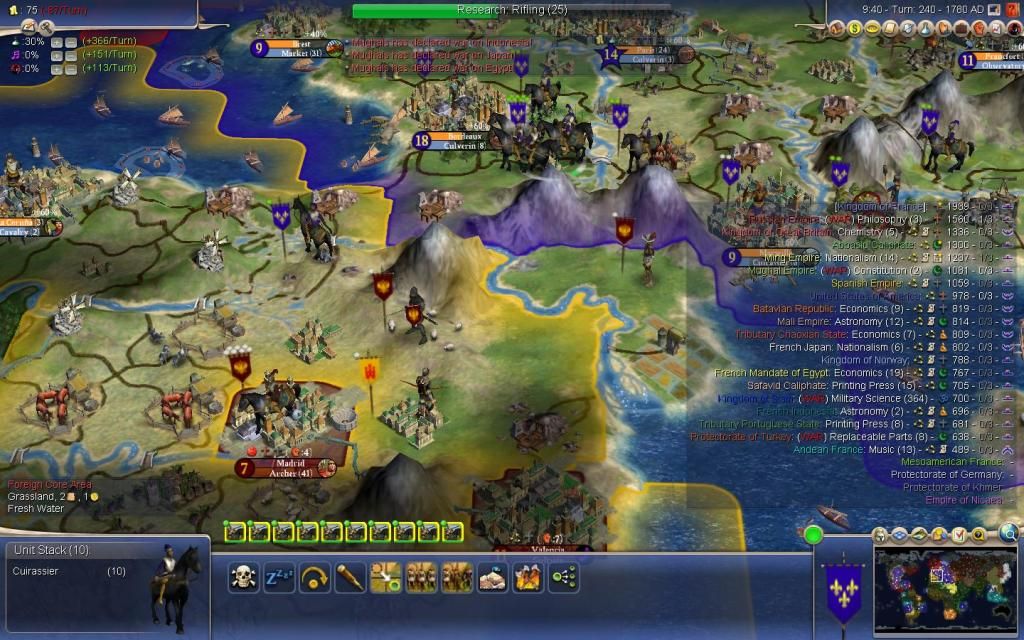
Madrid and Valencia were liberated from Russian despotism.
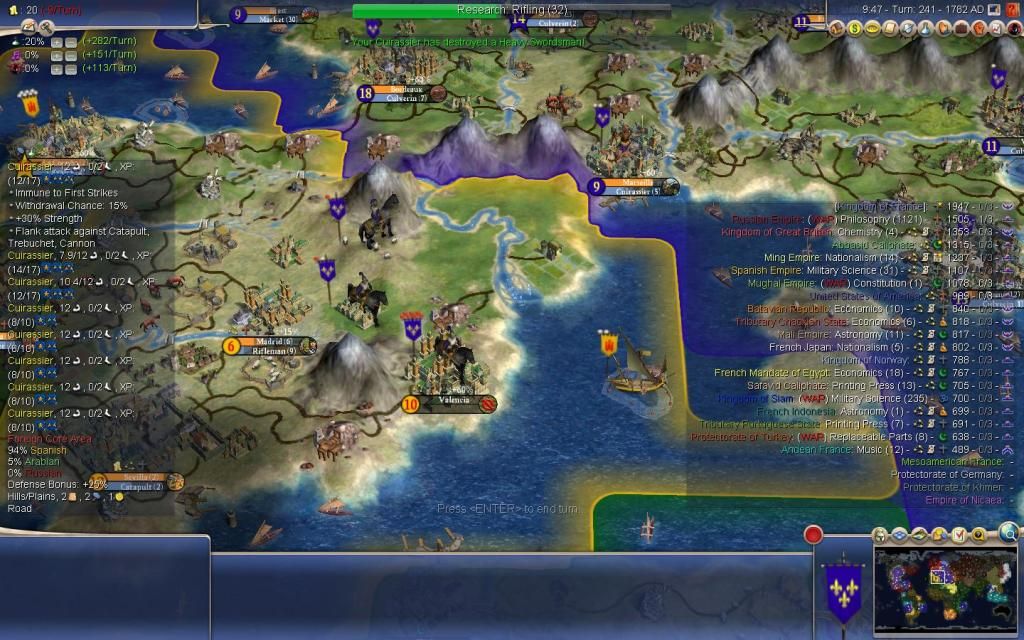
Constantinople was subjected to Turkish siege.
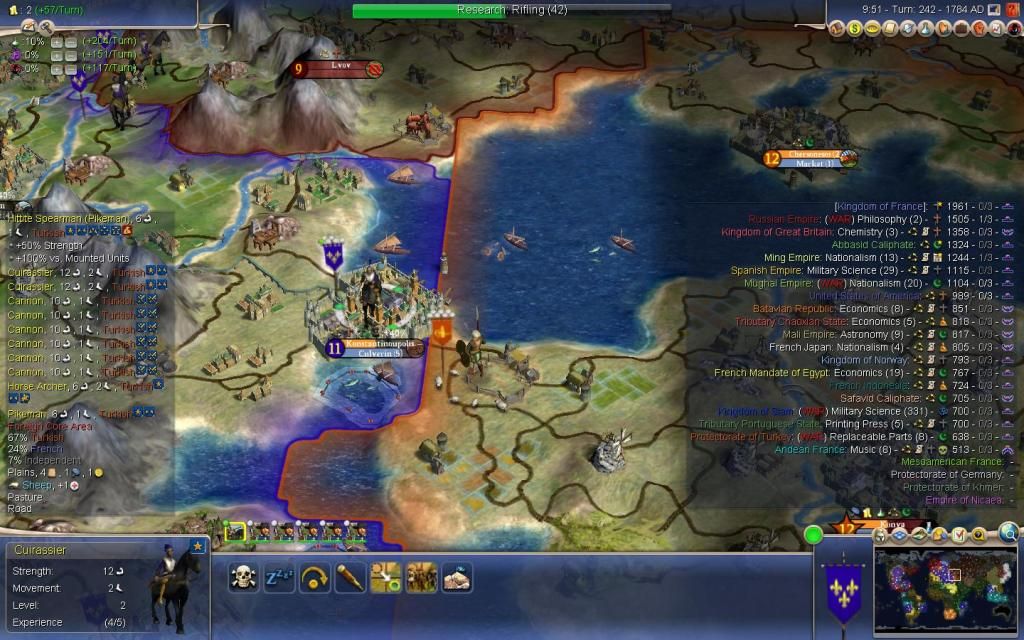
Seeing that France is detracted, Portugal grabbed Singapore.

French troops invade Galicia to liberate the people of Ukraine from the Russian iron fist. But the Russians assembled their own army in Belarus.
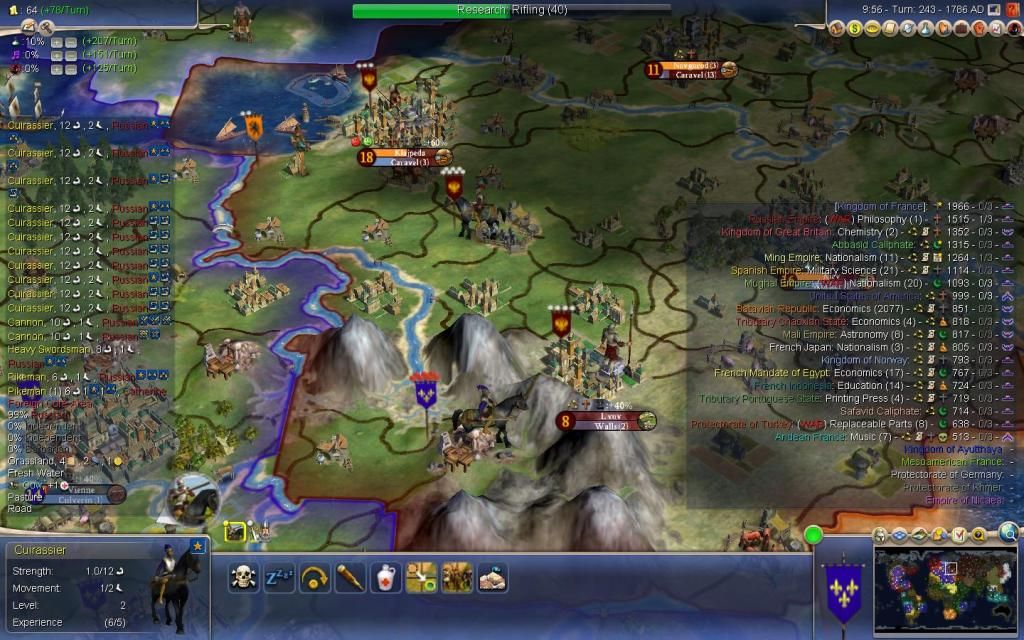
The Turkish siege was unsuccessful.
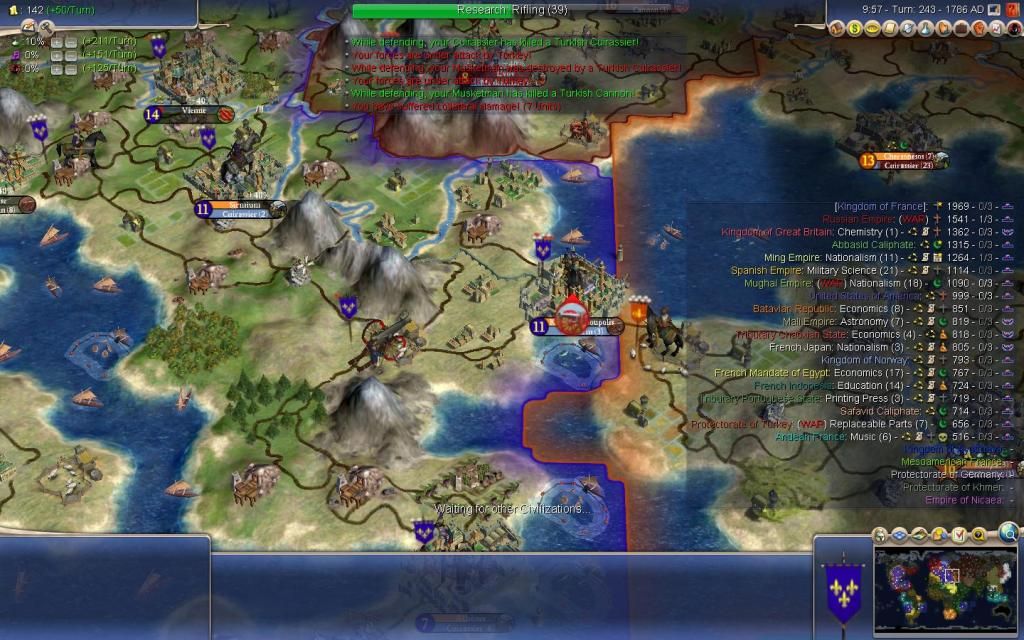
French cavalry had to return from Galicia to Poland.

The Russian attack was decimated. However, it gave Russian governor of Ukraine more time to prepare his defences.

Meanwhile, troops from Siam fought with the Great Mughal for the riches of India.
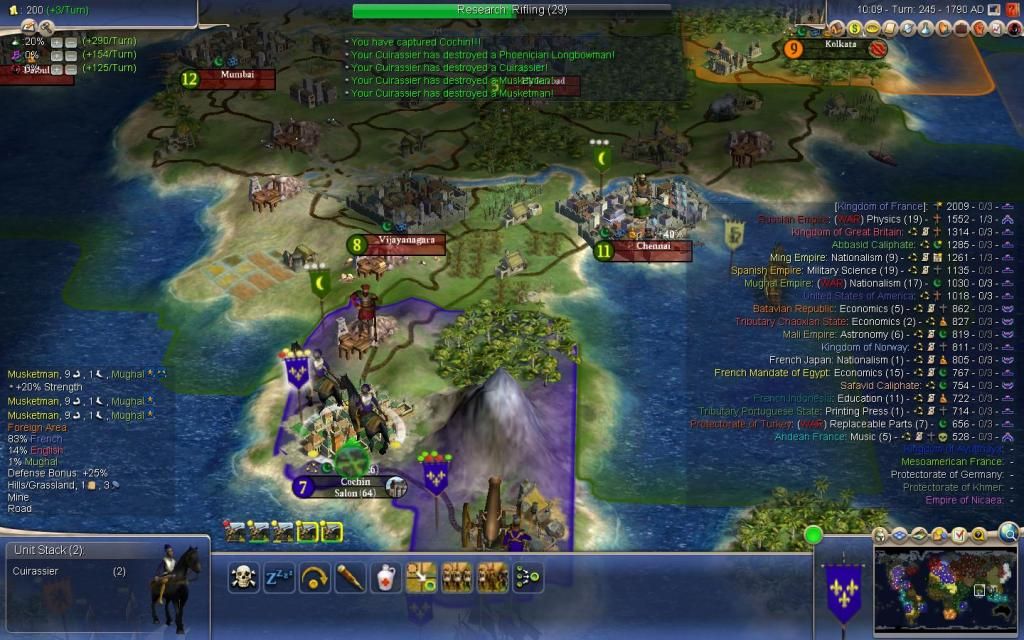
In 1792, last Turkish troops were chased away from the Second Rome.

The Mughal had to agree to peace. However, Kolkata proved to be a poor investment, and was returned to him soon.

British-French relationship continued to improve as London decided to return some Mexican areas to France.
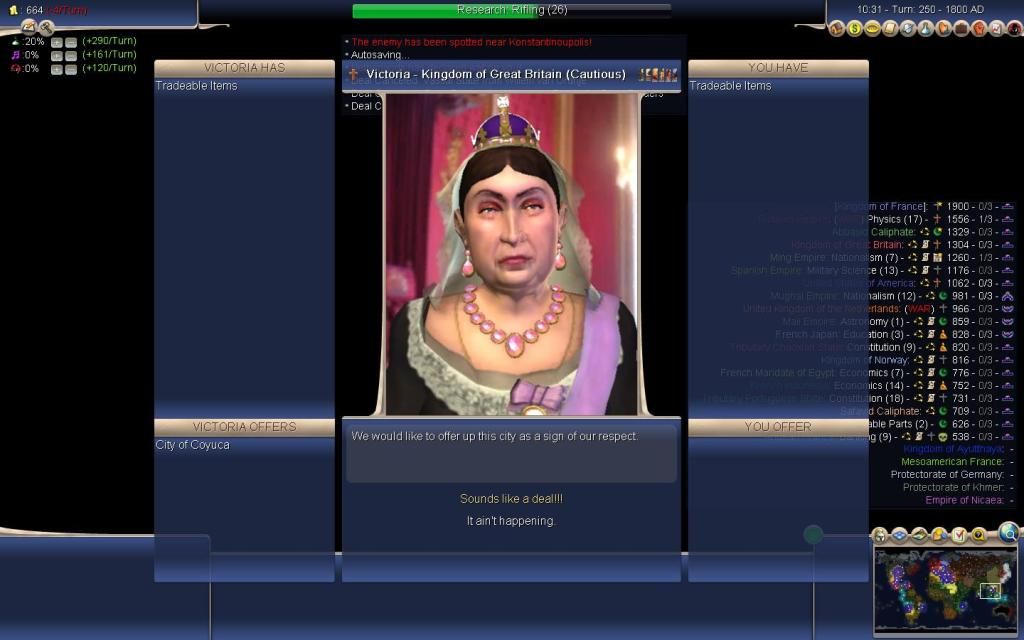
But Russian diplomatic intrigue managed to place anti-French forces to power in Netherlands. Dutch ships, supported by gold from Siberian mines, attacked French Indonesia.
In RFC-DoC 0.81 the Trading Company event didn't check for the supposed colonial power being a vassal and declaring on its master.

Finally, 1802 saw French cuirassiers parading in Lvov.
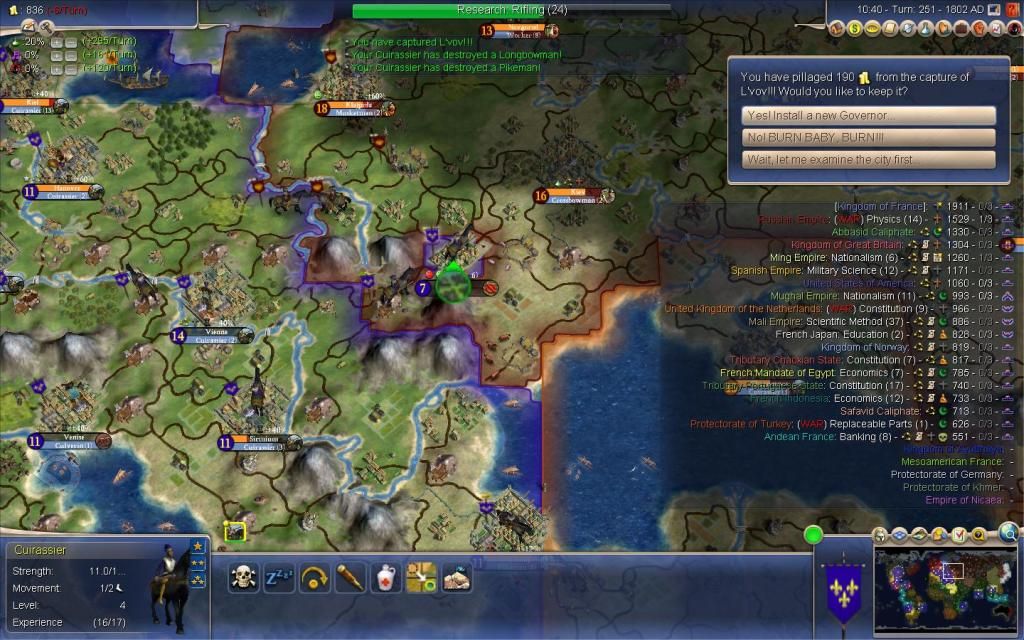
Kiev was poorly defended. But the Russian Czar managed to put together another army.
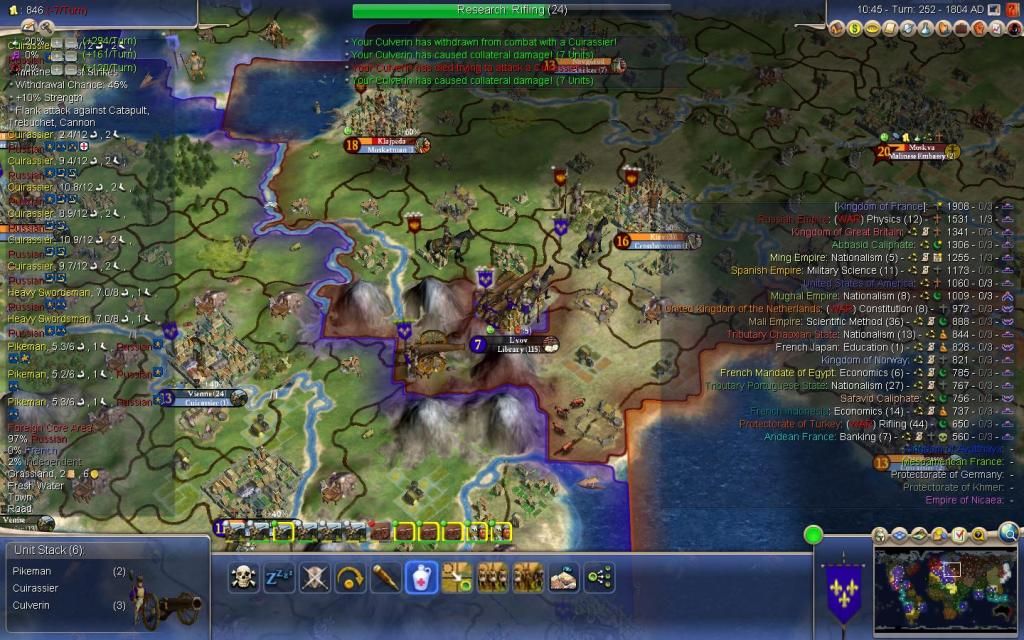
A well-timed attack from Lvov neutralized the threat. But French forces also suffered significant losses.
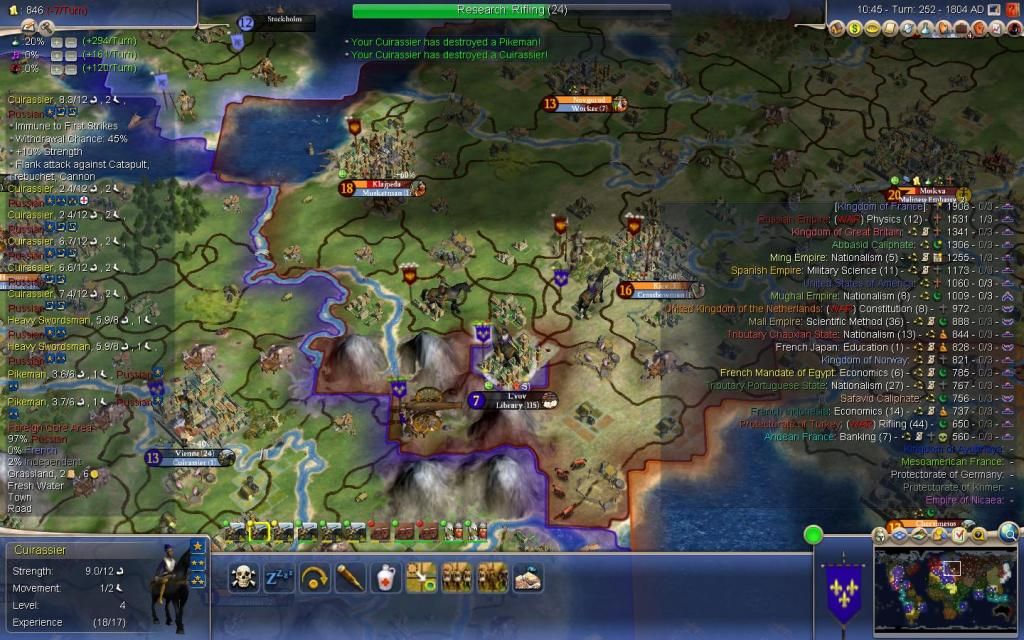
The Viceroy of Far East masterfully conducted the "No Dutch scum in these waters" operation.

The battles in Ukrainian steppes were bloody. Both armies were finding it difficult to hide from each other. Yet, with their last effort, French cavalry managed to break the Russian defences and enter Kiev.
"Jewish brothers", should, of course, read "Protestant brothers". But, as Catholic French propaganda asked, are the Protestants really better then the Jews?

With both sides exhausted, peace was signed.


Madrid and Valencia were liberated from Russian despotism.

Constantinople was subjected to Turkish siege.

Seeing that France is detracted, Portugal grabbed Singapore.

French troops invade Galicia to liberate the people of Ukraine from the Russian iron fist. But the Russians assembled their own army in Belarus.

The Turkish siege was unsuccessful.

French cavalry had to return from Galicia to Poland.

The Russian attack was decimated. However, it gave Russian governor of Ukraine more time to prepare his defences.

Meanwhile, troops from Siam fought with the Great Mughal for the riches of India.

In 1792, last Turkish troops were chased away from the Second Rome.

The Mughal had to agree to peace. However, Kolkata proved to be a poor investment, and was returned to him soon.

British-French relationship continued to improve as London decided to return some Mexican areas to France.

But Russian diplomatic intrigue managed to place anti-French forces to power in Netherlands. Dutch ships, supported by gold from Siberian mines, attacked French Indonesia.
In RFC-DoC 0.81 the Trading Company event didn't check for the supposed colonial power being a vassal and declaring on its master.

Finally, 1802 saw French cuirassiers parading in Lvov.

Kiev was poorly defended. But the Russian Czar managed to put together another army.

A well-timed attack from Lvov neutralized the threat. But French forces also suffered significant losses.

The Viceroy of Far East masterfully conducted the "No Dutch scum in these waters" operation.

The battles in Ukrainian steppes were bloody. Both armies were finding it difficult to hide from each other. Yet, with their last effort, French cavalry managed to break the Russian defences and enter Kiev.
"Jewish brothers", should, of course, read "Protestant brothers". But, as Catholic French propaganda asked, are the Protestants really better then the Jews?

With both sides exhausted, peace was signed.

Last edited:
Daedwartin
Emperor
- Joined
- Jan 6, 2012
- Messages
- 1,785
Dang it. Thought you would take a lot more of Russia then you did.
Lone Wolf
Deity
- Joined
- Dec 4, 2006
- Messages
- 9,908
Patience, patience and again, patience.Dang it. Thought you would take a lot more of Russia then you did.
Similar threads
- Replies
- 3
- Views
- 843
- Replies
- 48
- Views
- 6K
- Replies
- 1
- Views
- 930


 (aka civil war/secession)
(aka civil war/secession)